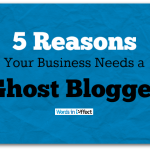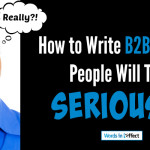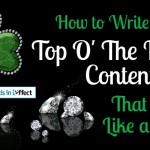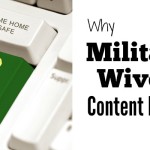By Becky Tumidolsky
C’mon, admit it: At some point, you’ve been tempted to promote your brand within your content. You thought, “One tiny plug can’t hurt. I’m just helping my prospects down the sales funnel a bit faster. I mean, since they’re reading my content, they’re already heading in that direction. Right?”
I feel your pain. I really do.
Most of us marketers have limited time to produce content; sometimes, we have a moment of weakness and crave an immediate return on our hard work. But the B2B audiences we’re targeting, they just refuse to go along with the plan. They can be stubborn that way.
I recently wrote a blog post that was, in essence, a fist bump to all my brothers and sisters in the content creation business. I discussed the writer’s creative process and the value we bring—a pretty self-indulgent approach. Sure, I enjoyed writing it. But I delivered virtually no value to my target audience. From an inbound marketing standpoint, the post was a nonstarter.
Sadly, I’ve seen other B2B marketers make similar mistakes. They start out offering a compelling narrative or staking out a well-reasoned position, and then they sully their content with self-absorption, canned puffery, or cheesy appeals.
When this terrible urge strikes, we content creators had best hit the brakes, or we’ll wreck our chance to engage audiences and earn their trust.
Your Prospects Know a Lemon When They See One
Your cute, sporty headline screams, “Come on over and take a test drive! This is the vehicle of your dreams.” So readers click through, only to find something cheap, awkward, clunky, and barely functional: a lousy sales pitch posing as content.
If you draw readers in by promising a unique, important benefit and then make a big, screeching U-turn to your brand, you’ve pulled a classic bait and switch. As I’ve written before, B2B audiences are a sophisticated bunch, and they don’t like to be played for fools. You’ll be damned lucky if they ever return to your lot, much less buy from you.
“Bait and Switch” Content Will Hurt Your Brand
As consumers, most of us have experienced this unscrupulous practice, which tends to not only fail miserably but also sink brand reputations. Even the once invincible Facebook is being accused of a bait and switch: enticing marketers to set up shop before curbing organic reach and offering paid boosts as a remedy.
In fairness, some marketers argue that Facebook is a for-profit enterprise, so we should have anticipated this shift toward a pay-to-play model. (Writes Shelly Kramer: “They gave us their crack cocaine for free. And we bit, hook, line and sinker.”)
Even so, by pulling the rug out from under so many businesses after they became so entrenched, Facebook irked a lot of people. Some have even accused Facebook of fraud (raising revenue through fake likes). Consequently, its brand continues to take a major hit.
The point I’m trying to make to content creators is this: Don’t take audiences for a ride.
Selling is all fine and good, as long as it’s attempted further down the sales funnel. Ideally, your content should follow through on its promise to benefit audiences (with no ugly surprises and no strings attached) and, as a result, engender their goodwill.
In the B2B Realm, There’s No Shortcut to Conversion
Today, consumers set the pace of the buying process. B2B prospects, in particular, take their sweet time making purchasing decisions; they must be convinced the status quo needs changing before they’ll even consider researching the field of competitors.
It’s tough to build unity around an idea (much less a brand) and move businesses to action when their purchase decisions typically rely on input from end users, decision makers and influencers—three very different groups with varying needs and agendas.
This stultifying inertia is a tremendous challenge for B2B marketers; overcoming it takes much time, effort, and patience. Since our prospects are in the driver’s seat, we can’t just step on the gas and hurry the sales process. But we can create outstanding content (informative, not self-promotional) to help steer prospects’ attitudes and attention in our favor.
Where Do You Stand?
How do you react to self-promotional B2B content? How do you perceive brands that publish it? Please share your thoughts below!

Since 2001, Becky Tumidolsky has written awareness-building content for B2B brands and their discerning audiences. Her work has appeared in leading publications such as Forbes, U.S.News & World Report, Bloomberg Markets, Newsweek, and Inc. as well as corporate blogs, websites, white papers, and other content assets.
Becky loves writing fluid, error-free prose. She’s even more passionate about building the foundation for her work—uncovering core brand distinctions, framing them thematically, and developing fresh, compelling narratives that advance corporate strategies.
Follow and connect: Twitter| Google+| LinkedIn| Facebook







Leave a Reply